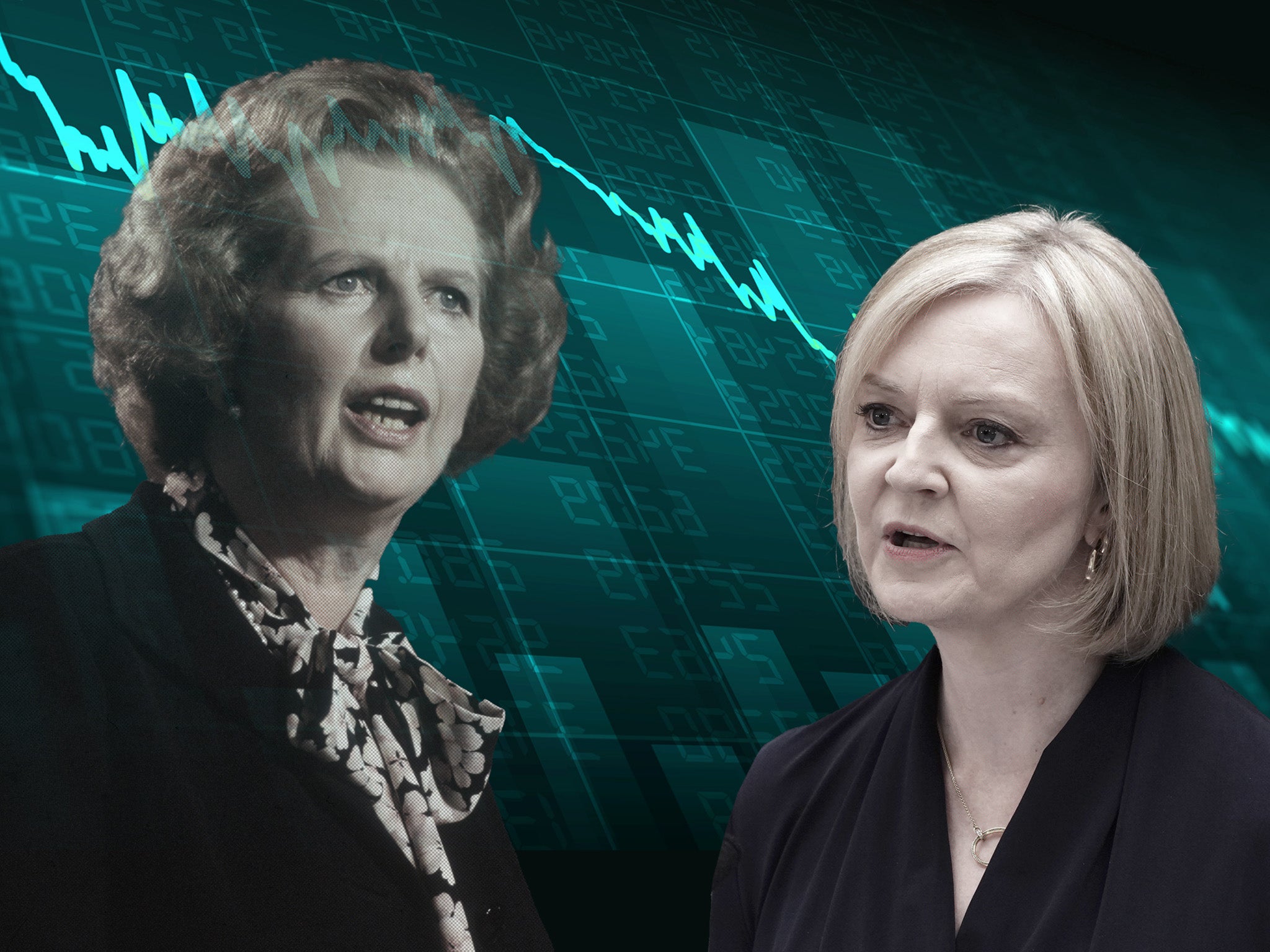The Independent's journalism is supported by our readers. When you purchase through links on our site, we may earn commission.
Truss falls back on Thatcherism that excites her base – but alienates most voters
Trussonomics: Can it work? Markets have not become freer under ‘free-market’ capitalism, they have become more monopolistic, writes Grace Blakeley


Your support helps us to tell the story
From reproductive rights to climate change to Big Tech, The Independent is on the ground when the story is developing. Whether it's investigating the financials of Elon Musk's pro-Trump PAC or producing our latest documentary, 'The A Word', which shines a light on the American women fighting for reproductive rights, we know how important it is to parse out the facts from the messaging.
At such a critical moment in US history, we need reporters on the ground. Your donation allows us to keep sending journalists to speak to both sides of the story.
The Independent is trusted by Americans across the entire political spectrum. And unlike many other quality news outlets, we choose not to lock Americans out of our reporting and analysis with paywalls. We believe quality journalism should be available to everyone, paid for by those who can afford it.
Your support makes all the difference.After 12 years in power, the Conservative Party is utterly devoid of talent and ideas. From the start of her campaign, Liz Truss was seen as awkward, robotic and rigidly ideological by her fellow MPs and she has done nothing to dispel these impressions.
Absent any real understanding of the deep pressures that many households are facing, and the deep resentment towards the British ruling class that these experiences are engendering, Truss has fallen back on a dogmatic Thatcherism that excites her base but alienates most voters.
When Truss tells the country that she believes tax cuts for the rich are “fair”, she is appealing to the part of the Conservative Party that feels Johnson’s populism has pulled the party away from its free-market roots. For these staunch neoliberals, tax cuts for the rich really are fair because they genuinely believe that extreme wealth is a reward for extreme effort.
There’s just one problem with this view: it’s utterly wrong. In a rigged economy like our own, you don’t get extremely rich by working extremely hard; you get extremely rich by extracting wealth from everyone else.
According to Oxfam, approximately one-third of billionaire wealth globally comes from inheritance and another third comes from crony connections to government. Much of the remainder comes from rentier sectors like commodities, finance, and property, where wealth is extracted rather than created.
The UK is one of the world’s rentier economies par excellence. As Brett Christophers has documented in his book Rentier Capitalism, most of the largest companies listed on the FTSE100 generate a substantial proportion of their revenue from rent-seeking. These companies hoard everything from land, to government contracts, to intellectual property and use their economic power to force up prices and profits.
The fossil fuel sector is the paradigmatic example of rentierism. BP and Shell have not become more productive over the past year, nor have they created many new jobs or undertaken much new investment. Yet their profits soared to £7bn and £10bn respectively in the second quarter of 2022 alone.
This is the economy that Thatcher created. Markets have not become freer under “free-market” capitalism, they have become more monopolistic. The state has not shrunk under neoliberalism, it has simply stopped helping the poor and started dishing out cash to elites.
Nowhere was this more obvious than during the response to Covid, when huge multinational corporations received billions of pounds worth of cheap loans from the Bank of England, only to distribute millions to shareholders and lay off workers.
In a rigged economy, taxing corporate and personal income is one of the few levers available to reduce inequality and, ironically, support economic growth.
Truss claims she wants the British economy to grow its way out of this crisis, but rentier economies are generally characterised by sluggish growth and productivity. This is because rentier industries don’t expand through productive investment; they expand by monopolising already existing resources.
Over the long run, low levels of productive investment dampen productivity and growth. This problem, combined with low levels of public investment, is precisely why the UK economy has stagnated since the financial crisis. If Truss provides these corporations with tax cuts, they won’t invest it. They’ll simply dish out the cash to shareholders or use it to shore up their monopoly power.
Read more from our series on ‘Trussonomics: Can it work?’ by clicking here
Truss claims her tax cuts will help the least well-off deal with the cost of living crisis, but they may actually end up making a bad situation worse.
Poorer households may benefit from an extra few hundred quid a year thanks to Truss’s tax cuts, but this won’t touch the sides of annual fuel bills – even capped at £2,500 until 2024. In fact, tax cuts will alleviate the burden on wealthier households, allowing them to spend more and push up the price of goods that are already too expensive for those on lower incomes.
Meanwhile, small businesses, which the Tories are supposed to represent, are facing such staggering increases in their gas bills that many will be out of business by the time any tax cuts do come into play. In short, trying to tackle the cost of living crisis with tax cuts is like trying to put out a forest fire with a bucket of water – or, perhaps, a bucket of gasoline.
Truss is attempting to cure the disease of Thatcherism with yet more Thatcherism. It won’t work. The only way to revive the UK economy and solve the cost of living crisis is to tackle the scourge of corporate power once and for all. That means, at the very least, taxing big businesses and the wealthy, nationalising natural monopolies like energy and water, and supporting the trade union movement. In short, reversing Thatcher’s “free-market” reforms.
Grace Blakeley is a British economics and politics commentator, columnist and author
Join our commenting forum
Join thought-provoking conversations, follow other Independent readers and see their replies
Comments